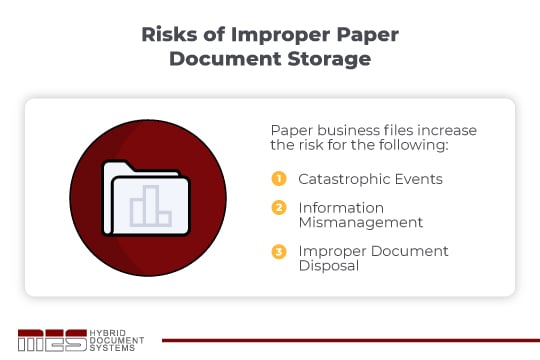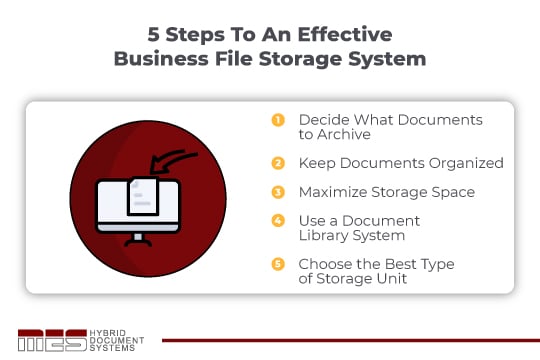Storing business files requires planning, organization, and easy access to maintain business efficiency. Here we offer a complete guide to effective business document storage.

Why is Proper Storage Important for Business Documents?
Proper storage of business files, whether they are paper records, microfilm, large format documents, or electronic documents, is essential for every business. Well-maintained files allow you to follow successful business best practices, including:
Essential Management for Storing Files
A practical document management process ensures all departments follow the same steps when creating, organizing, storing, sharing, and archiving documents. It creates an environment where the document lifecycle follows the same stages regardless of the format. As a result, you have efficient access to data. Scanning paper and microfilm documents is the best way to create a proper records management system. It creates a single format to create a file system of digital documents designed to improve efficiency and security.
Industry Compliance
A proper document management system ensures you follow regulatory compliance. Paper documents can be scanned so you can safely store data based on industry protocols and best practices. Your storage system then quickly retrieves digital documents to prove you adhere to compliance practices.
Data Loss and Natural Disaster Management
Proper file systems, whether paper document files and folders or an electronic document storage system, reduce the risk of information loss. Electronic backup with digital documents provides quick restoration of lost, deleted, or damaged files due to natural disasters, fire, or system failures.
Customer Service
Proper file storage ensures documents are easily accessed to provide information for customers. Quick retrieval reduces wait times and keeps your customer service team responsive to customer needs. Proper records management also ensures personal information is protected to avoid confidentiality breaches.
Company Data Preservation
Document storage preserves proprietary information and data, allowing you to maintain your competitive edge. It also provides valuable insights for smarter business decisions based on past performance.
Risks of Improper Paper Document Storage

Paper business files increase the risk for the following:
Catastrophic Events
Lost or damaged paper documents due to catastrophic events present significant issues for your business. Paper is vulnerable to water, fire, pests, mould, mildew, vandalism, and burglary, contributing to interruption to business operations. Damaged documents also present serious compliance issues. Although copying all documents for storage offsite is an option, it is costly and still leaves paper documents vulnerable to catastrophic events. A digital document cloud storage system ensures all information is maintained, with backups for dependable data protection.
Information Mismanagement
Internal issues such as document loss, theft, or misuse are more likely to occur with paper documents. These issues can contribute to legal liability, fines for non-compliance, and customer loss that negatively impacts your bottom line. Cloud storage services or data management systems ensure files are appropriately managed with safeguards such as role-based access to help keep documents secure.
Improper Document Disposal
Improper document disposal exposes customers to identity theft and fraud. Paper documents increase the risk of documents landing in the recycle bin. Digital files can be safely deleted when documents reach the end of their life cycle.
Benefits of a Proper Business File Storage System
A proper business file storage system provides many benefits, including:
Quicker Document Recovery
Your documents are recovered quickly in the case of data loss or catastrophic events. Electronic data storage offers the best form of backup, designed to match the file-based storage of your paper records so you can quickly access documents ready for file sharing and use.
Improved Workflows
Improper business file storage leads to inefficiencies due to timely document searches, difficulties sharing documents, lost files, outdated versions, and more. A digital document management system is the best document tool to streamline workflows, simplify data sharing, and introduce role-based authorization to expedite approvals. Storage devices and cloud-based systems also allow remote team members to access documents from anywhere.
Reduced Costs for Storing Files
Storing paper document archives in hand with space for active file cabinets costs money. With a proper business file storage system, you can use office space more efficiently or consider moving to a more affordable, smaller space. Digitization of inactive paper documents is the best way to eliminate storage costs for archives.
Version Control
Proper document management ensures your documents are organized with access to the current versions. You can also limit access to authorized team members to reduce the risk of errors or document alterations that cause confusion and disrupt workflows.
Regulatory Compliance for Storing Files
Document management requires careful consideration to comply with all applicable document regulations, including tax laws, confidentiality, legal documents for proprietary information, and Occupational Safety and Health Administration (OSHA). Non-compliance can lead to legal issues and fines that affect your bottom line. Your reputation is protected by following strict protocols with a proper business file storage system.
File Sharing and Security
Physical documents are costly and risky to share. Using a proper filing system such as digital storage makes it easier to share files efficiently and securely. Several people can access the same file at once, and you can also improve security by limiting access to key players. File access is also possible from anywhere, using multiple devices.
Cross-Departmental Functionality
Proper document storage systems can be integrated with various departmental apps and software to limit disruptions and improve collaboration across HR, marketing, manufacturing/supply chain, customer service accounts payable and receivable, etc.
Documents such as invoices can be shared between marketing and accounts payable, warehousing records can be used to track customer orders, HR can share applications with hiring departments, etc. Automation of manual tasks improves many business processes, such as invoice/document review and approval, customer order confirmation, searching for job applications, etc.
Instant Document Retrieval
Proper paper business file storage makes it easier to find and use documents. However, they are not as efficient for cross-referencing searches. A digital document storage system allows you to choose how data is stored, searched, and saved to create consistency throughout a document’s life cycle. Indexing identifies keywords for searches.
You can also use hierarchical storage based on the frequency of use with faster storage devices used for the most popular files. Unique identifying meta tags allow each department to find what they need using specific naming protocols when saving documents. Object-based storage is another option if you manage significant amounts of unstructured data. This method uses unique identifiers but creates distinct units or “objects” to determine how tags and metadata are applied.
5 Tips and Steps To An Effective Business File Storage System

Your paper document storing system calls for organization to ensure your business file storage system is effective. Here are five tips and steps to keep your filing system manageable and efficient:
1. Decide What Documents to Archive
Sort through your documents to determine what documents are active, what can be archived, and what can be destroyed. This will ensure you don’t waste time on outdated papers you no longer need. Be sure that anything you decide to destroy is handled according to regulations based on the type of information. There are proper protocols for information destruction. For example, rules determine how long you must retain files, such as tax documents.
Also, many types of documents require shredding with a certificate to prove destruction was handled properly. Scanning documents is the best approach for archives as you won’t need to take up physical space or pay for storage at a facility.
2. Keep Documents Organized
As you sort through your documents, group them logically to make them easier to file and retrieve. Consider how team members are most likely to search for files, whether it is by date, order number, customer name, project name, etc., so you can label storage boxes and individual files accordingly. For example, you might want to store tax documents by year and label them with the tax year and the year you can legally destroy them. You’ll also need to consider the best storage: banker boxes, sturdy plastic boxes, metal filing cabinets, etc.
Keep in mind paper is vulnerable, and even the natural aging process can cause damage. Again, you might consider scanning paper records to simplify storage. You can scan documents and save them using meta tags that make it possible to search them based on criteria such as date, order number, customer name, project name, department, etc. You also won’t have to worry about damage or physical storage space.
3. Maximize Storage Space
You’ll need to invest in shelving and sturdy boxes to make the most of your storage space. This maximizes storage by taking advantage of vertical space. Using filing cabinets isn’t as practical for archives as they are limited in their capacity and can’t be stacked. Also, consider the most frequently accessed files and place them closer to the door.
To make things easier, you can create a scan-to-zero plan that allows you to scan and digitally store paper documents gradually. This is a more straightforward process than bulk scanning and paper document storage, providing endless storage capacity, easy document retrieval, and no need for expensive storage facilities.
4. Use a Document Library System
It is easy to quickly lose track of paper documents as people take them out of storage for various purposes. A library system that checks documents in and out of storage keeps track of who has what. Electronic files avoid this issue.
5. Choose the Best Type of Storage Unit
This is important as you want to ensure you have enough storage for your documents. Choose something too big, and you waste money on storage costs. Choose something too small, and you will keep adding more storage space as your documents expand. You also need a climate-controlled unit to avoid paper damage, which is more expensive than a standard storage unit. Digitizing documents provides a scalable document storage solution without worries of paper damage.
Types of On-Demand Documents Every Business Owner Needs
Data access is an essential element of your document storage system. Here are the types of documents every business owner needs to access often:
Tax Documents
Tax documents to file your business and personal taxes should be accessible for at least three years.
Financial Documents
Invoices, bills, financial reports, purchase orders, and all relevant financial data for your day-to-day operations contribute to sound financial management and business decisions.
Human Resources Documents
Employee information, talent databases, job performance records, etc., are essential to career development, employee retention and recruitment, legal support for HR conflicts, and more.
MES works with companies across the country to create effective plans for storing files and paper documents affordably and efficiently.
Please contact us today for a customized project quote suited to your specific needs. We are also here to discuss the benefits of document scanning, scan to zero, and document management systems.


